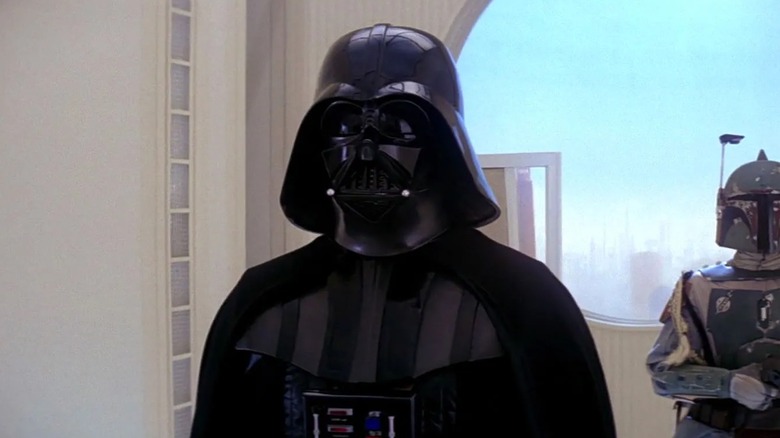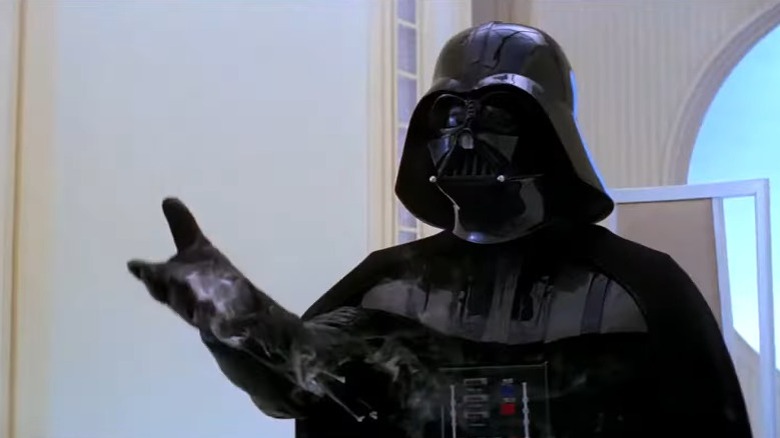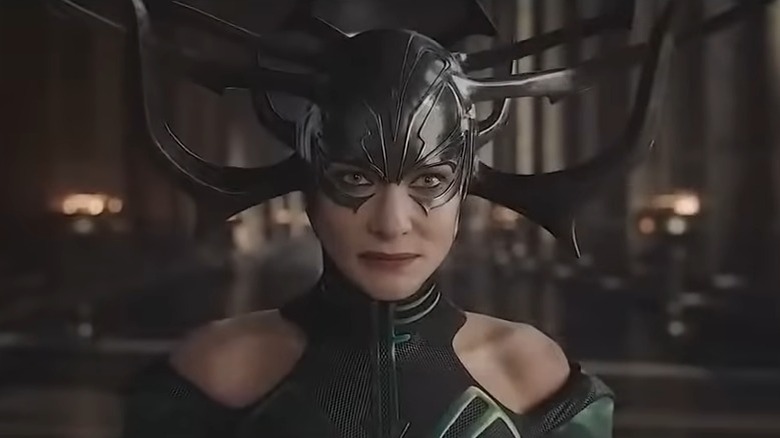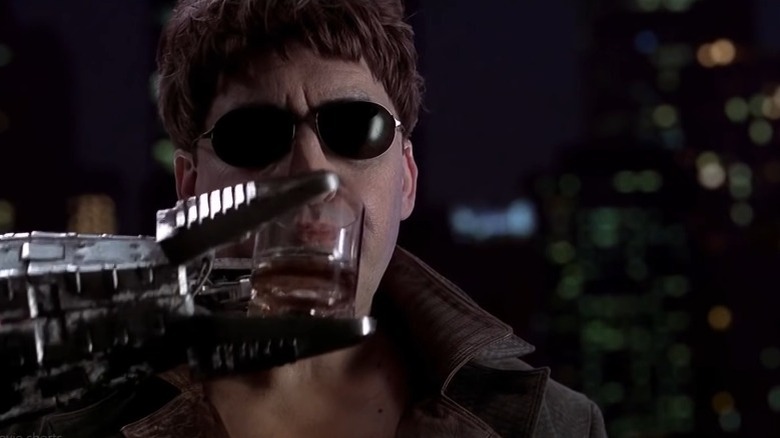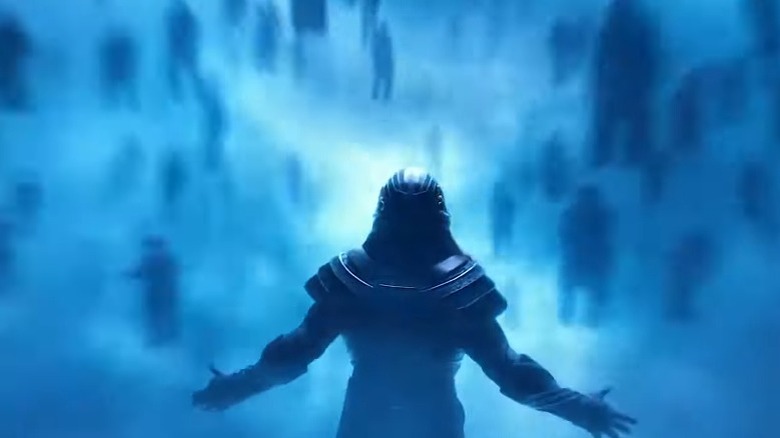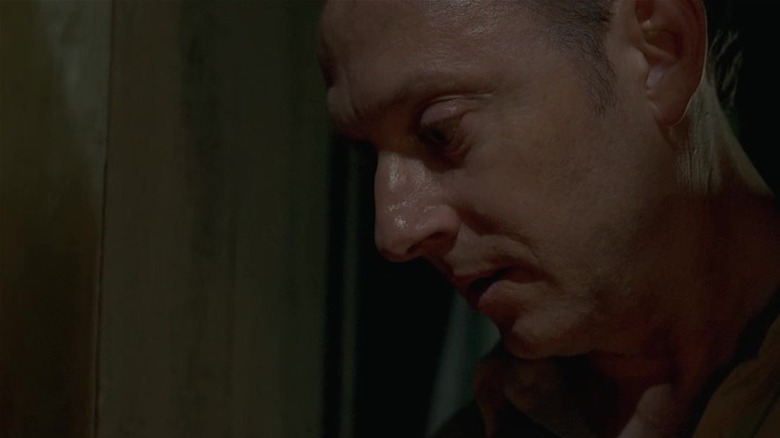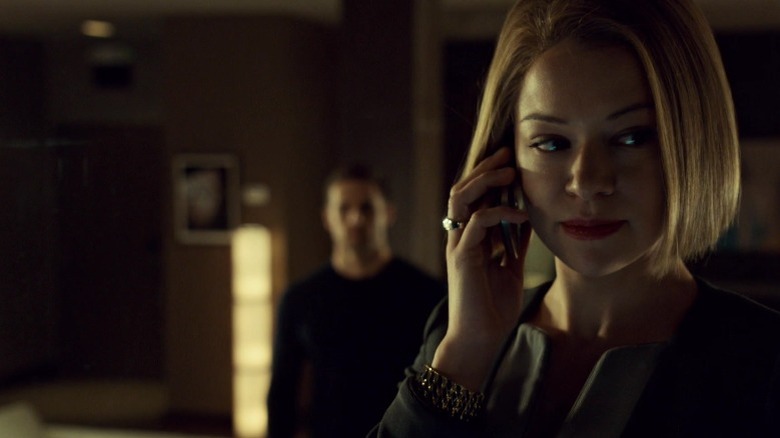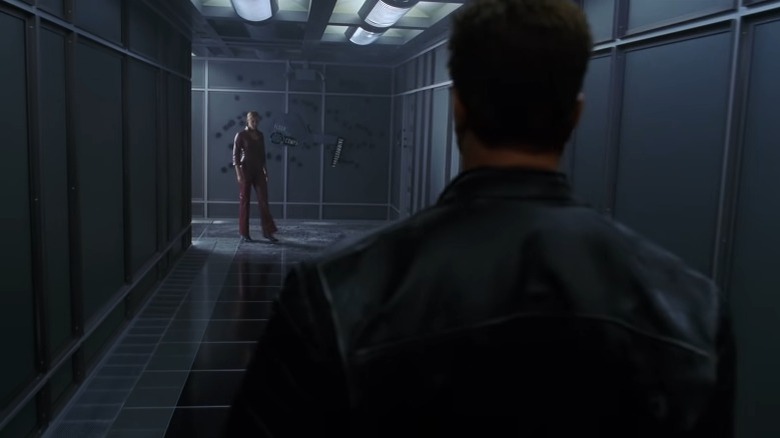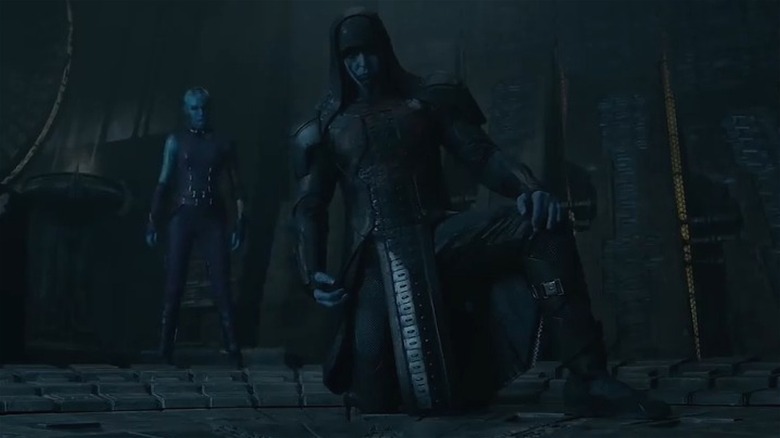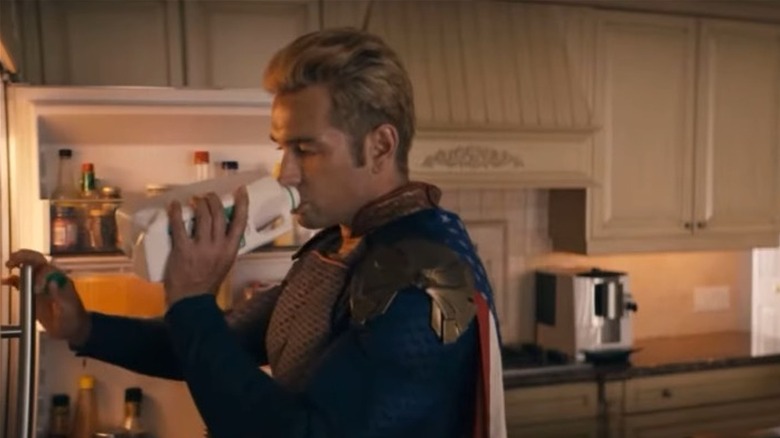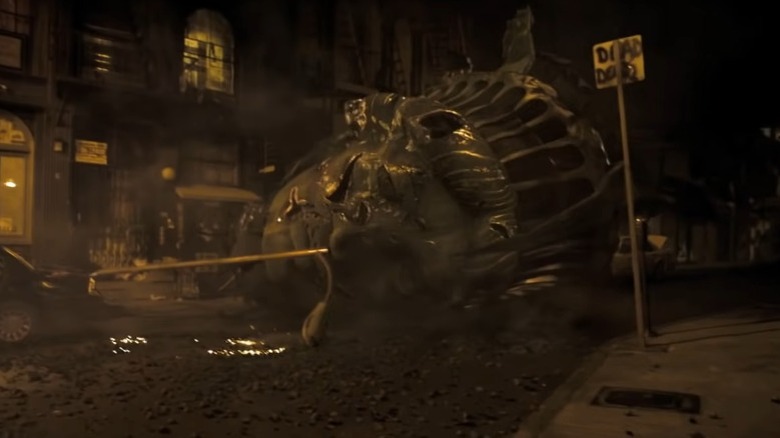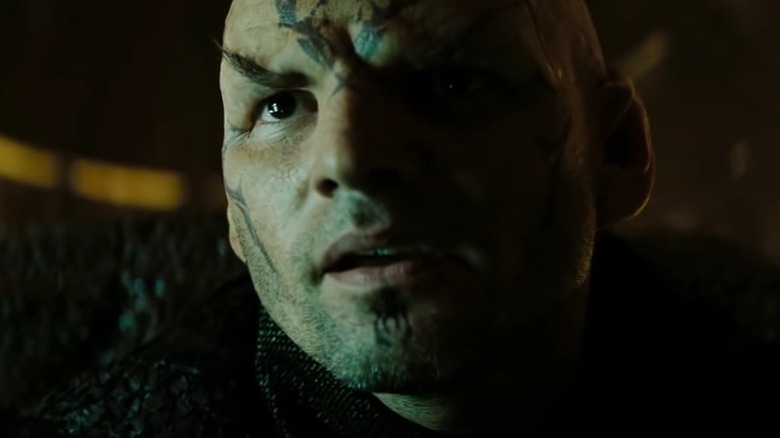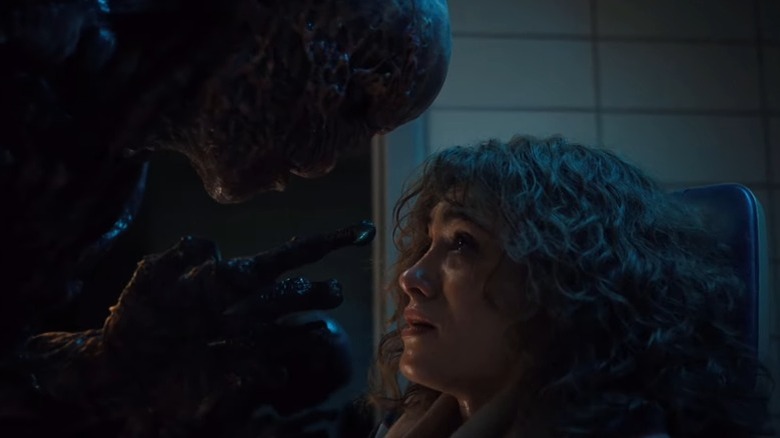Bloopers That Change The Way You See These Sci-Fi Villains
A good blooper brings the fun in any circumstance, and a good sci-fi blooper provides the bonus of philosophical schadenfreude: A genre premised on the efficiency of technology, suddenly falling prey to the fallibility and unseriousness of man. A lot of the best sci-fi movies and shows — especially those of the more meditative "hard sci-fi" variety — don't even release blooper reels, so as not to break the illusion of an immersive high-tech world.
Among the movies and shows that do, however, we often have the pleasure of watching the villains of the high-tech worlds in question fumble their way through scenes and lines, or just up and go off-script for the sake of the crew's momentary entertainment. And the results can be hilarious, endearing, and even informative about what makes those movies and characters tick. From Cate Blanchett to Tatiana Maslany to Jamie Campbell Bower to a stubborn light pole, these bloopers cast sci-fi villains in an entirely new light.
Star Wars: The Empire Strikes Back - David Prowse as Darth Vader catching blasters
And what better way to kick off the list than with the most iconic villain of all time, not just in sci-fi but in all of pop cinema? Much of Darth Vader's fearsomeness came from the sheer mystery and majesty in which he was shrouded as a screen presence in the original "Star Wars" trilogy. Not only was James Earl Jones' voice work impeccably authoritative, but it seemed like every single move David Prowse made as Vader's physical performer was imbued with deep precision and purpose. We couldn't see Vader's face to make out what he thought or felt, but Prowse's curt, economical gestures spoke for themselves.
Incidentally, that's just what makes this blooper from "The Empire Strikes Back" so amusing. The scene in question is one of the film's most shocking turning points, in which Lando Calrissian (Billy Dee Williams) leads Leia Organa (Carrie Fisher) and Han Solo (Harrison Ford) to a room in Cloud City where Vader turns out to be waiting for them. Han attempts to draw a blaster at Vader, but Vader quickly Force-snatches it away from him. The blooper reveals that the panache of Prowse's blaster-catching movement was picked out of various near-identical takes. "Vader" keeps catching one blaster after another after another with yells of "Action!" in between, to the point where his lack of emotional expression starts reading less as "intimidated" than "bored."
Thor: Ragnarok - Cate Blanchett making sound effects with her mouth
Cate Blanchett knew from blockbuster sets by the time she boarded the Marvel Cinematic Universe in "Thor: Ragnarok." We're talking, of course, about the original live-action Galadriel — and, in addition to the "Lord of the Rings" films, the Australian actress appeared over the years in big, action-driven projects ranging from "Hanna" to "Robin Hood" to "Indiana Jones and the Kingdom of the Crystal Skull." "Ragnarok," however, more than likely marked Blanchett's first time donning a motion capture suit and partaking in make-believe fantasy stunts; indeed, the obvious joy she's taking in the role of Hela accounts for 50% of why that movie works so well.
As it turns out, she may even have experienced a little too much joy. The blooper reel of "Thor: Ragnarok" brims with snippets of Blanchett acting goofy in between takes, in a way that might come as a surprise to those who only know her for the regal screen persona she channels as Thor's warmongering sister. And the most invaluable of those snippets reveals that the two-time Oscar winner struggled with one particular challenge of fantasy action cinema: conjuring sounds in your head. While filming a scene as Hela, Blanchett makes sound effects with her mouth to match her character's necrosword-summoning gesture, and then immediately corrects herself. "I shouldn't make the noises with my mouth, should I?" she asks, bursting immediately into self-deprecating laughter.
Spider-Man 2 - Alfred Molina trying to drink using a metal arm
Sam Raimi's "Spider-Man" films serve as the blueprint for a great deal of what contemporary audiences know and love in superhero cinema, and the villain performances in them are no exception. Alfred Molina's take on Dr. Otto Octavius, in particular, has gone down in history not just for Molina's enormous commitment and the brilliant performance that resulted from it, but for the actor's sense of humor on and off screen.
As a case in point, "Spider-Man 2" outtakes reveal that Molina fully understood how inherently funny it was for him to be walking around wearing Doctor Octopus' metal tentacles, and he wasted nary an opportunity to make the crew laugh. His performance of "If I Were a Rich Man" from "Fiddler on the Roof," with the tentacles used for snapping and jazz hands, is pretty legendary by itself, but arguably even funnier is the blooper snippet showing his multiple attempts at drinking from a glass of bourbon held by a tentacle. Each time the coordination between Molina's head, his delivery of "Hello, Harry," and the arm's movement falls short of perfection, resulting in fake whiskey spilling all over him, Molina breaks into giggling all over again. At one point, he even shakes his head at the absurdity of it all. Charlie Chaplin was truly onto something when he poked fun at the whole concept of automated feeding in 1936.
X-Men: Apocalypse - Oscar Isaac as Apocalypse being goofy during the climax
The "X-Men" film franchise has spiraled and sputtered to the point where some fans are all but begging for it to be rebooted, but, not so long ago, its unlikely tightrope walk between different temporal continuities actually worked pretty darn well. In fact, one can easily pinpoint the moment where things began to go south: 2016's "X-Men: Apocalypse," the muddled, convoluted third installment in the prequel series. Chief among the film's many, many errors, it cast Oscar Isaac, then at the height of his climb to superstardom, in the role of the titular villain — and then gave him absolutely nothing of note to do as an actor.
The character of En Sabah Nur, a.k.a. Apocalypse, was written in such a dour, generically portentous way that Isaac couldn't inject any sort of life into the role, even if he weren't completely covered in emotion-nullifying prosthetics. But when you watch the film's bloopers, you can clearly see the drama of a once-in-a-generation wellspring of acting talent and charisma inhabiting a completely charisma-free character. While shooting the film's climax, in which Apocalypse engages in a telepathic fight with Professor Charles Xavier (James McAvoy), Isaac can't help himself, and jokingly interrupts a long cry of pain to declare "Oh, it feels good!" It's more entertaining than anything in the film.
Lost - Michael Emerson failing to open a door
For all the talk about what an immense, fascinating mythology and how many gripping mysteries it spun over the course of its run, "Lost" really doesn't get the credit it deserves for its strength as a simple, bare-bones character drama. And few characters proved more compelling characters on it than Ben Linus, the Michael Emerson-played antagonist who eventually became more morally ambiguous and sympathetic than his cold, calculating demeanor originally let on.
Above anything else, Ben was a great character because of his deliberate, yet opaque, actions; Emerson's monotone constantly concealed a million layers of indecipherable intention. Towards the end of Season 3, the series doubled down on that strange allure by ramping up the mystery of Ben's association with the Others' alleged true leader, Jacob. But, while shooting one of the most important "Lost" scenes ever, in which Ben finally takes John Locke (Terry O'Quinn) to Jacob's supposed cabin hideout, the actors encountered a bit of a logistical issue. As seen in the "Lost" bloopers, during one take, the door jammed as Emerson tried to open it — leading to the extremely rare sight of Ben Linus at a loss as to what to do. O'Quinn, ever the mood lightener, immediately started quipping: "Open the door, Jacob, that's not funny." Emerson tried to stay in character at first but eventually broke into laughter as well. And then so did the whole crew.
Orphan Black - Tatiana Maslany calibrating her delivery as Rachel
Rather than undercut the fantasy, "Orphan Black" bloopers amp up the magic of the show's signature special effect. That would, of course, be Tatiana Maslany's multiplicitous performance as the clones at the center of the Project Leda conspiracy. It's a hoot to watch Maslany slip in and out of character. Her superhuman dedication to nailing each performance comes through even more clearly when we see her drop the act and just be herself for a moment.
The most fascinating example is her "downtime" as Rachel Duncan, the show's icy central villainess. As the least-fleshed-out, most reserved of the main Leda clones before her character revamp in Season 4, it's easy to take for granted how much Maslany transforms when donning Rachel's golden bob and slipping into her posh British English. And then you watch her flub Rachel's calm delivery of instructions during a phone call and mumble "Ah, crrrrap it," followed by a cut to Maslany asking — in her real, significantly higher-pitched voice — "More acid?" It's a peering-behind-the-curtain moment: She actually sounds like this. And what's more, each of her line readings as Rachel, no matter how "natural" to the character they sound, is the result of careful deliberation with the filmmakers. Talk about acting, man.
Terminator 3: Rise of the Machines - Kristanna Loken waltzing with Arnold Schwarzenegger
In many ways, the story of the James Cameron-created "Terminator" franchise is also the story of Hollywood blockbuster cinema over the past four decades. And, although 2003's "Terminator 3: Rise of the Machines" rates as far from the franchise's best-remembered entry, it is still notable as the transition point between the grounded, meat-and-potatoes analog action of the first two classic entries, and the all-out CGI fest of the post-"Terminator Salvation" era. It is also notable as the only film in the series so far to feature a female-presenting Terminator as its primary antagonist.
Kristanna Loken, with her icy stare and statuesque, intimidating Euro beauty to rival Arnold Schwarzenegger's own, was herself a marker of the early-2000s brand of action movie star, and she made her film acting debut in the role of the daunting, merciless T-X in "Rise of the Machines," for which she proved to be a great fit. Fans of the series appreciated Loken's chemistry with Schwarzenegger and the movie's various, excitingly even Terminator-on-Terminator fights. And one particular behind-the-scenes moment reveals that the two actors were considerably less robotic out of character. While shooting a scene that finds the Terminator running up to the T-X to engage it in combat, Loken and Schwarzenegger instead break into a perfectly synchronized waltz, seemingly in a pre-arranged effort to make the crew laugh. Not bad for a machine to whom desire is irrelevant.
Guardians of the Galaxy - Lee Pace delivering a nonexistent line
A Kree warrior, unsure of himself? It's more likely than you think. Every "Guardians of the Galaxy" film features a great dramatic actor as its main antagonist, and, fittingly for this particular MCU sub-franchise, each of those actors also boasts a knack for comedy. On that note, Lee Pace's work as Ronan the Accuser in the inaugural 2014 film is arguably the least-remembered among fans — which makes sense, as that film had its hands full with establishing a huge set of heroes — but he's quite possibly the funniest actor yet to have played a "Guardians" villain.
If you want proof of it, look to the movie, which sees Pace gives a performance absolutely delectable in its knowing narminess, delivering every one of Ronan's megalomaniacal speeches with absolute conviction. He, as they say, understood the assignment. Or, watch the blooper reel. One of the things it reveals about the three films' seemingly very fun sets is that, while shooting a scene on Ronan's ship, the Dark Aster, Pace delivered a line with such purpose and intensity that you'd think it represented the character's most important moment. Except the line in question — "Today, power becomes the only law!" — is nowhere to be found in the finished film, and, immediately after saying it, the reel shows Pace slipping out of character and wondering aloud, "Wait, that's not right, is it?"
The Boys - Antony Starr having trouble drinking milk straight from the container
Antony Starr's Homelander is arguably the most terrifying villain on television right now. A cynical, pathetic, tantrum-throwing, self-obsessed manchild who nonetheless keeps getting his way and amassing hordes of admiring followers just by virtue of holding an immense amount of power, he offers an all-too-real analog to so many of our own world's beloved evil men. Even more impressively, "The Boys" consistently manages to spark a kind of primal, baffled revulsion at the character's sheer strangeness — the chief example of which may be his milk obsession.
Narrative and thematic reasons explain why Homelander is fixated on drinking human and dairy milk, of course. But the sight of him desperately chugging it never ceases to be disturbing, and, to his credit, Starr makes those scenes convincing every single time. As the show's blooper reel reveals, however, that requires some effort. Even in a scene that shows him simply drinking regular cow milk from a jug — possibly the show's only instance of Homelander engaged in "normal" milk consumption — Starr needs to psych himself up and focus intently to bring the gallon to his mouth without wincing. If ever you needed proof that Antony Starr and John Gillman are two completely different people, it doesn't get much clearer than that.
Cloverfield - Light pole being lowered too slowly
Part of the wonder of Matt Reeves' "Cloverfield," the trailblazing found-footage monster flick that ballooned into a cinematic universe, is the way it contrasts highly realistic handheld camerawork with believable mass-scale horror. No other kaiju film before it or since so adroitly convinced the viewer that this could be happening to them. For that gambit to work, the film needed incredible — and incredibly immersive — visual effects; any one snippet of its behind-the-scenes footage is mind-boggling just for how carefully engineered it reveals Clover's rampage to be.
One moment in the film's blooper reel, however, brings about the opposite thought, showing how easy it would have been for a movie like that to not be convincing at all. In the scene where the Statue of Liberty's head suddenly lands in the middle of a street, a light pole should fall to the ground — a practical effect. But, during the shoot, the pole doesn't fall completely, instead just lowering itself very, very, very slowly. Eventually, the crew gives up and starts laughing.
Star Trek (2009) - Eric Bana ad-libbing a fourth wall break
Everyone talks about the great casting in J.J. Abrams' 2009 "Star Trek" reboot. From Zoe Saldana to Zachary Quinto and John Cho to Anton Yelchin, the casting choices were, indeed, across-the-board winners. But kudos go, too, to the choice of Eric Bana as the film's villain, Captain Nero, an original character who struck just the right balance between emotionally credible and entertaining, perfectly befitting Abrams' pop-friendly vision for the "Star Trek" universe.
Bana's performance as Nero is a blast, full of the idiosyncratic textures and counterintuitive line deliveries that any new "Trek" villain should have. The character's underrated comedic streak, as it turns out, even extended to Bana's behavior on set. In what may well be the most irreverent moment in this list, Bana concludes a bitter monologue to Spock about how Nero will enjoy the destruction of Vulcan with... an out-of-nowhere fourth wall break. "I've been waiting for this day my whole life," he snarls. "You will die. Your people will die. J.J. Abrams will die. You will all die." It sure paints a whole new picture of Nero's relationship to spacetime.
Stranger Things - Jamie Campbell Bower accidentally saying Yes as Vecna
Seeing what "Stranger Things" actor Jamie Campbell Bower looks, acts, and sounds like in real life can be a bit of a shock to the system after a season's worth of being terrified of him as Vecna. The show's decision to portray its ultimate big bad largely via prosthetic makeup allows Bower to impart a rawness and a sense of physicality to Vecna that make him that much more credible — and therefore scarier — as a screen presence. But it also makes the contrast with the real Bower jarring: When out of dungeons-'n'-drag, in real life or playing Henry Creel, you can almost see Vecna there, even as you're just looking at a normal guy. Mentally, it's all rather tricky to process.
Not for nothing, that's exactly what makes bloopers and behind-the-scenes footage featuring Bower-as-Vecna so entertaining. At a moment's notice, he can break character and amplify the cognitive dissonance: Suddenly, we're looking at Vecna, but with the demeanor of a sweet, hilarious English actor. For instance, the Season 4 blooper reel shows that, during one take of the scene in which Vecna traps Nancy Wheeler (Natalia Dyer), Bower accidentally let a "Yes" slip out in response to Dyer's cries of "No!" It was enough to take Dyer out of the moment and cause her to laugh — followed, of course, by Bower's characteristically boisterous snicker.
